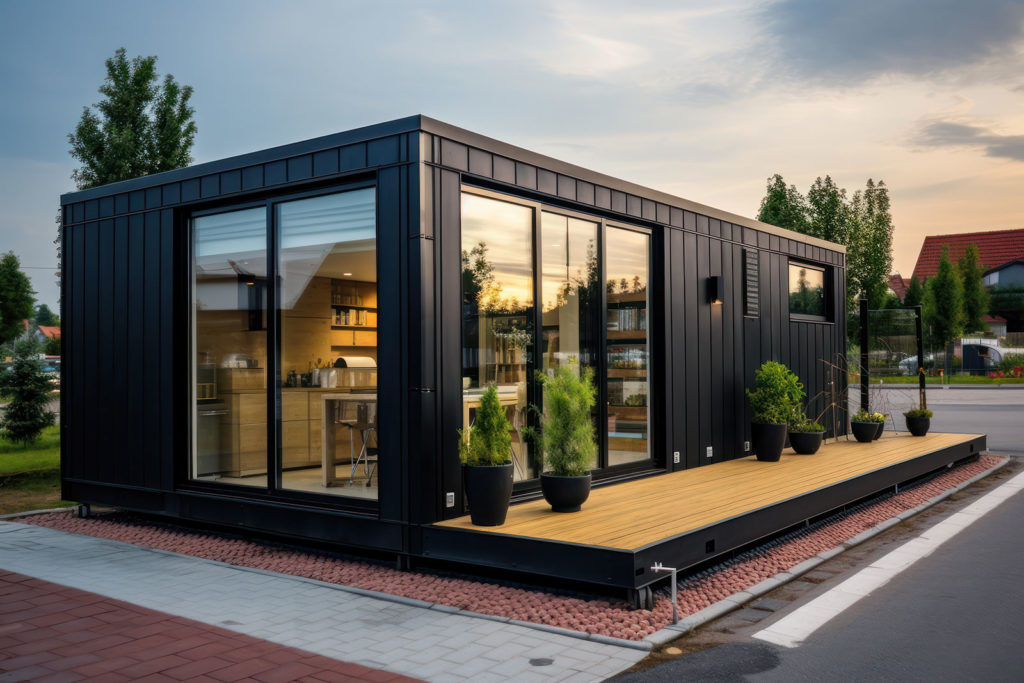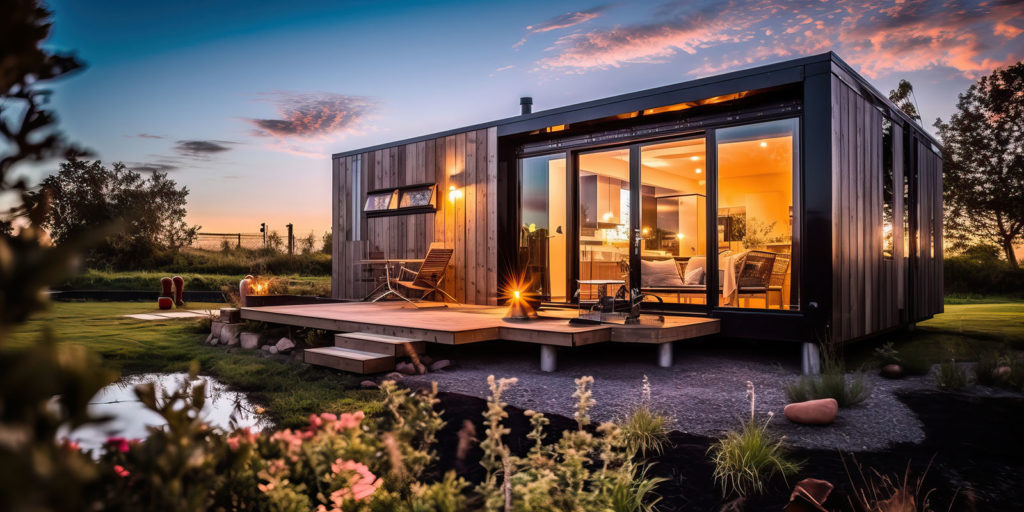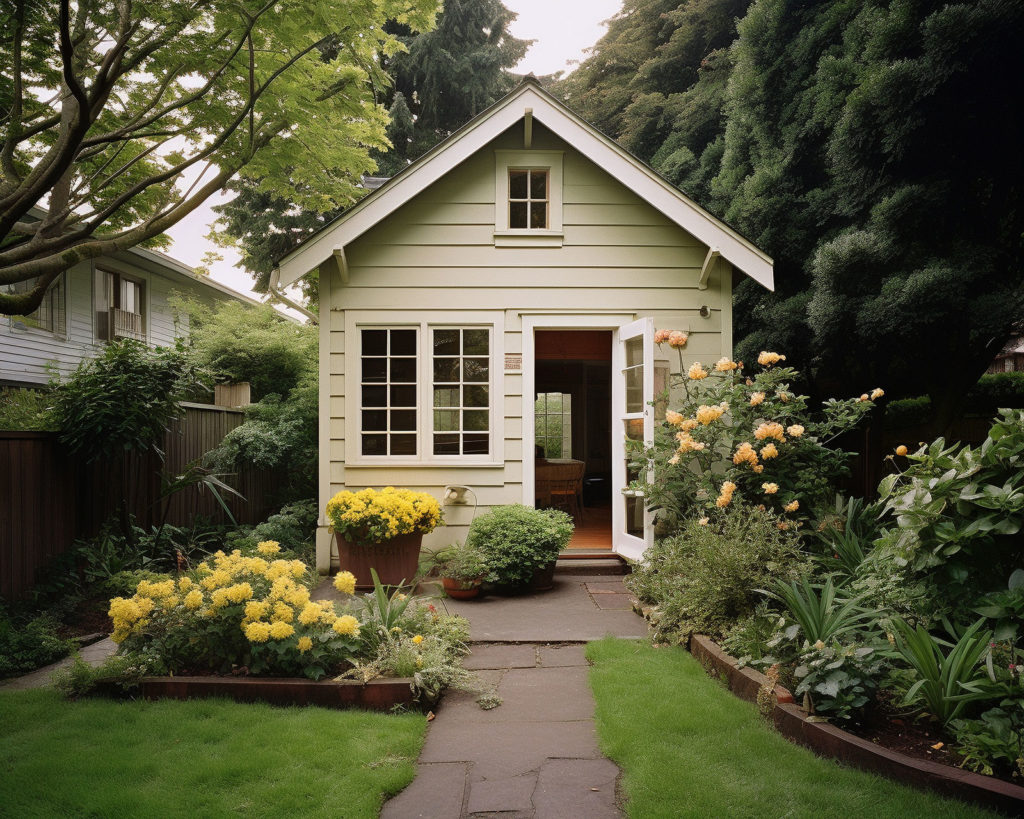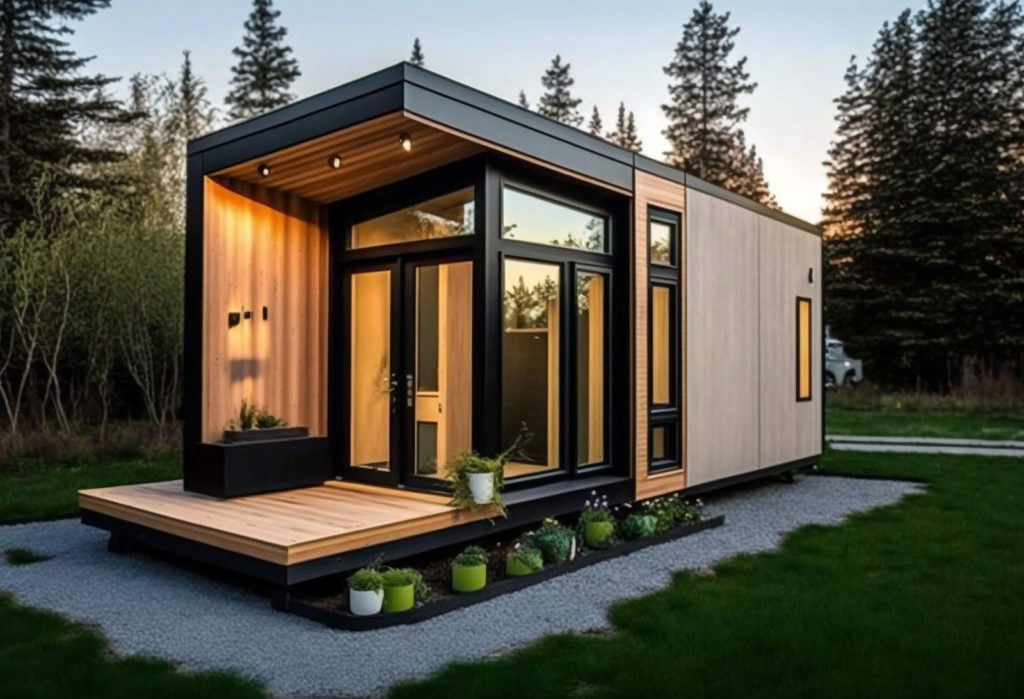Tiny homes have become increasingly popular in recent years, offering an alternative to traditional housing options for those seeking a more minimalist and eco-friendly lifestyle. In cities such as Toronto, tiny homes now offer a solution to the housing crisis, providing financially attainable living spaces for residents impacted by the high cost of housing in the area. These small yet innovative dwellings are designed to maximize the use of space, while also incorporating sustainable and energy-efficient features.
As Tiny Homes gain more traction in Toronto, residents are exploring various aspects such as off-grid living, construction processes, and the growing tiny home communities. Off-grid living allows homeowners to be more self-sufficient by incorporating solar panels, water collection systems, and other sustainable features. The construction process of tiny homes often involves careful planning and utilization of high-quality materials and build techniques, with local companies such as Acorn Tiny Homes offering unique designs to cater to individual preferences. Meanwhile, tiny home communities and markets continue to emerge and thrive, forming strong connections and networks of support for those embracing this alternative housing option.
Key Takeaways
- Tiny homes in Toronto are a popular response to the city’s housing crisis, providing affordable and sustainable living spaces for residents.
- Off-grid living and eco-friendly features are increasingly sought after in the tiny home movement, offering self-sufficiency and reduced carbon footprints.
- The construction and supply of tiny homes in Toronto is growing, with local companies and communities offering resources and support to those transitioning to this unique lifestyle.
Understanding Tiny Homes
Tiny homes have gained popularity in recent years, especially in urban areas where housing prices are on the rise, such as Toronto. These small dwellings provide a simplistic and affordable living option for those seeking a more minimalistic lifestyle. Usually defined by their size, tiny homes typically measure under 400 square feet. However, these compact structures come in various shapes and sizes and can be referred to as micro homes or nanohouses.
Despite their limited space, tiny homes can offer a surprising level of comfort and functionality. They often feature a single bedroom, or alternatively, a loft area that can be used as a sleeping space. The efficient use of the available square footage allows for a living room, compact bathroom, and kitchen to be accommodated within the structure. Due to the smaller size and emphasis on efficient design, these homes usually have lower utility costs compared to traditional houses.

In Toronto, there are even modest communities that are embracing this new trend in housing, such as “Tiny Town.” One can find a variety of tiny homes, ranging from quaint one-bedroom cottages to more modern, sleek designs. Popular among first-time homeowners and those interested in downsizing, tiny living reflects an alternative approach to traditional housing choices. These innovative living spaces can be found not just in the city, but also in nearby areas like Goderich.
Some benefits of tiny living include:
- Lower housing costs
- Simplified lifestyle
- Reduced environmental footprint
- Flexibility in location and mobility
However, it’s essential to understand that tiny living might not suit everyone’s preferences or needs, as it often requires a willingness to embrace minimalism and adopt creative organization techniques.
If you are interested in exploring tiny homes and tiny living opportunities in Toronto or nearby areas, several resources and listings are available to guide your search and educate you on how to make the most out of your cozy new space.
Tiny Homes in Toronto
The growing demand for affordable housing has led to a surge in interest for tiny homes in Toronto. These smaller abodes offer a practical solution for those looking to live more sustainably and avoid high costs associated with traditional housing in the city. In recent years, numerous tiny home projects have popped up around Toronto, providing several innovative designs for potential homeowners.
Tiny Toronto Homes is a company that specializes in crafting diverse and efficient housing designs, with passive house principles and sustainable building technologies in mind. They offer a wide range of shapes and sizes to cater to different circumstances and preferences. From downtown Toronto to the suburbs, these micro-homes continue to gain popularity for their modularity and compact design.
A tiny home usually falls under the 400 sq.ft range, with some being even smaller, referred to as micro homes or nano-houses. Factors such as fuel costs, cost of living, and budgetary needs influence the size and design of these homes. Despite their size, they offer all the necessary amenities and can be customized to suit the individual’s needs. This type of housing is gaining attention in Toronto where the Urban Guide For Living Tiny in 2023 offers valuable information to those interested in this lifestyle.

Various tiny homes can be found for sale in Toronto and its surrounding areas, with prices as low as $26,000 to more luxurious options at $210,000. These homes often come equipped with modern features like flush toilets, propane heating, and comfortable living spaces. Some even have more advanced features like a pet door, hidden litter box, and a washing machine, catering to the diverse needs of prospective buyers.
In conclusion, tiny homes in Toronto provide an alternative housing solution for those seeking affordability and sustainability, without sacrificing the convenience and comfort of traditional homes. As the city continues to grow, it is evident that the demand for tiny homes will only increase, offering more options for those wanting to adopt this eco-friendly lifestyle.
Features of Tiny Homes
Tiny homes in Toronto are designed with functionality and efficient use of space in mind. They often come equipped with an array of features that cater to various needs while maintaining a smaller footprint.
The kitchen area is typically compact, yet it still provides essential appliances, such as a stove, a microwave, and ample storage for utensils and food items. Some tiny homes even come with a custom-designed cabin featuring a large, round window, creating a unique and cozy dining experience. To save space, foldable tables and chairs are common in these homes.
In the bathroom, you will find eco-friendly solutions like composting toilets to minimize water usage, which fits the sustainable lifestyle that many tiny home dwellers aim to achieve. Showers or compact bathtubs are also available in many tiny house designs.
An interesting aspect of some tiny homes in Toronto is their mobility. By adding wheels to the structure, homeowners can easily relocate their homes whenever desired – providing flexibility in terms of location and lifestyle choices.
On the exterior, a deck can be found in many tiny home designs. This outdoor space serves as an extension of the living area and is perfect for recreation or relaxation. It can also be used to house pets, such as a cat.
Inside, office spaces and recreation areas are creatively incorporated into the design. Multipurpose furniture, such as fold-out desks, convertible sofas, or murphy beds, maximize available space. Clever storage solutions are also incorporated, utilizing every square foot to its full potential, which makes tiny homes in Toronto ideal for urban living.
In summary, tiny homes in Toronto come with a range of features that cater to modern urban living needs while emphasizing sustainability and efficient use of space. With innovative designs and smart solutions, these homes provide a comfortable and eco-friendly living experience.
Off-Grid Tiny Home Living
Off-grid tiny home living offers a sustainable, self-sufficient, and eco-friendly lifestyle for many homeowners. In Toronto, this type of lifestyle is gaining popularity due to increasing environmental concerns and the housing crisis. One of the key features of off-grid tiny homes is the incorporation of a solar system to generate electricity. Solar panels are mounted on the roofs of these homes to harness the sun’s energy, making them a crucial component of off-grid living.
A well-designed solar system can effectively power appliances, lights, and heating systems, eliminating the need for grid-tied electricity. Solar panels and batteries work together to store energy for later use, ensuring a steady supply of electricity even on cloudy days. Off-grid tiny homes may also utilize other alternative energy sources such as propane for cooking and heating.
Another vital aspect of off-grid tiny home living is water and waste management. Compost toilets are commonly found in these homes, as they provide an environmentally friendly solution for waste disposal. By decomposing human waste into nutrient-rich compost, these toilets help to reduce water usage and decrease the impact on local sewer systems.
Water conservation is crucial in off-grid living and can be achieved by implementing rainwater collection systems, greywater recycling, and using low-flow fixtures. Propane-powered tankless water heaters further contribute to reducing water usage and are easily integrated into off-grid tiny homes.
In addition to the sustainable features already mentioned, off-grid tiny homes in Toronto are usually well-insulated and built using eco-friendly materials. This helps to minimize heat loss and maintain a comfortable living environment with minimal impacts on the environment.
To summarize, off-grid tiny home living in Toronto encompasses a range of sustainable features, including solar systems, compost toilets, and energy-efficient appliances. The combination of these elements creates a self-sufficient and environmentally conscious living space, ideal for those looking to minimize their ecological footprint.
Financial Considerations
When considering tiny homes in Toronto, it is essential to understand the various financial aspects involved. These may include aspects such as rent, financing options, and the cost of purchasing a tiny home.
One of the main benefits of choosing a tiny home is the potential to save on living expenses. Toronto is known for its high housing costs; however, tiny homes can provide a more affordable alternative. In general, tiny homes are cheaper than traditional homes or apartments, with some available for sale at prices as low as $51,000.
Financing a tiny house can be done in multiple ways. Options include an unsecured personal loan, which can be an ideal choice for those looking to purchase a tiny home on a solid foundation or build their own RV. This loan type provides a lump sum to be repaid over a few years, making it convenient for many buyers. More financing options can be found at Finder Canada.
Important factors to consider when financing a tiny home include:
- Budget and overall financial status
- Available space and lifestyle requirements
- Interest rates and repayment terms on loans
- Potential resale value in the future
In many instances, the energy bills of a tiny home are significantly lower than those of a conventional house or apartment. Residents can share power outlets or opt for off-grid solar systems to increase self-sufficiency, resulting in reduced energy bills.
When looking into tiny house living, it’s essential to be aware of the potential limitations of traditional mortgages or loans for trailers. Due to their unique nature, tiny homes may not be eligible for traditional financing options. In such cases, it’s crucial to explore unique financing methods, such as the aforementioned unsecured personal loans or specialized loans for tiny houses.
In summary, carefully considering the financial aspects of tiny home living can help potential residents make informed decisions and find a suitable solution for their unique housing needs in Toronto.

Building and Construction
When constructing a tiny home in Toronto, it is important to consider the various aspects of the building process, including permits, engineering requirements, the Ontario Building Code, foundation options, and zoning regulations.
To begin the process, acquiring the necessary permits is crucial. It is essential to check with local authorities to confirm which permits are required for your specific project, as permit requirements may vary based on location and the type of structure being built.
Next, consider the engineering requirements for your project. Typically, tiny homes are built on mobile trailer foundations or permanent foundations. Engaging a licensed engineer will help ensure that your home is structurally sound and meets all the applicable codes and regulations. Working with a professional can also help you navigate the complexities of the Ontario Building Code, which sets forth the minimum requirements for building safety, energy efficiency, and accessibility in Ontario.
It’s worth noting that the foundation you select for your tiny home will impact its construction and zoning compliance. Mobile trailer foundations offer portability, while permanent foundations provide a more solid base. Your choice may depend on your plans for the home and the zoning regulations in your area. In either case, it is essential to follow best practices and local building codes for foundation construction.
Lastly, familiarize yourself with the zoning regulations in your area. Zoning by-laws govern how land can be used, including the types of structures allowed, and where these structures can be built. Compliance with these by-laws is crucial to avoid potential legal issues later on.
In summary, to successfully build a tiny home in Toronto, it’s important to follow permits, engineering, Ontario Building Code, foundation, and zoning regulations. By doing so, you can ensure a smooth construction process and a safe, comfortable dwelling for years to come.
Tiny Home Builders and Suppliers
Toronto’s tiny home movement is gaining momentum, with several builders and suppliers offering unique, functional, and eco-friendly options. Among these, Acorn Tiny Homes stands out as a notable Canadian designer and builder. Located in southern Ontario, they specialize in creating bespoke Tiny Homes, ensuring that each home is as unique as the people who live in them.
Skilled craftsmen are at the heart of the tiny home building process. These experts possess extensive knowledge of sustainable building technologies, and their attention to detail ensures the highest quality results for every project. Many of these builders adhere to passive house principles, which prioritize energy efficiency and environmental responsibility.
For those interested in bespoke tiny homes, customization is key. Multiple factors come into play when designing and constructing these individualized spaces, such as:
- Material choices (e.g., reclaimed wood, eco-friendly insulation)
- Interior layout (including storage solutions)
- Off-grid living capabilities (such as solar panels or composting toilets)
- Mobility (tiny homes on wheels, skids, or foundations)
Some Ontario-based builders also offer a variety of options to suit the particular needs of potential tiny home owners. These may include tiny homes on wheels, container homes, modular homes on foundations, and on-site accessory dwelling units (ADUs) or secondary dwellings.
In conclusion, the thriving tiny home scene in Toronto can be attributed to the skilled craftsmen, green building principles, and talented builders like Acorn Tiny Homes. Thanks to their dedication and expertise, future tiny home owners can confidently choose a sustainable, functional, and personalized space to call their own.
Sustainability and Environment Concerns
Tiny homes have been gaining popularity in places like Toronto due to their potential benefits for sustainable living and addressing environmental concerns. One of the key advantages of tiny homes is their reduced environmental impact as they require fewer materials for construction and less energy to power, heat, and cool compared to traditional single-family houses. A TED Ideas article highlights these benefits, pointing out the reduced use of materials and energy.
Environmental Benefits:
- Less materials: Tiny homes use fewer materials for construction, which means less waste and reduced resource consumption.
- Energy efficiency: Due to their smaller size, tiny homes require less energy for heating, cooling, and powering appliances. This results in decreased greenhouse gas emissions.
- Land use: Tiny homes typically occupy a smaller footprint, allowing for more green space and natural habitats to be preserved.
When considering sustainable living, tiny homes can provide a viable option for those looking to minimize their environmental impact. Many tiny homes are designed with sustainable features such as solar panels, rainwater collection systems, and composting toilets, further reducing their ecological footprint.
However, it’s crucial to be mindful that tiny homes are not a one-size-fits-all solution for sustainable living. Some individuals might struggle with the limited space and may still contribute to environmental issues through transportation or consumption habits. It’s essential to consider the various aspects of sustainable lifestyles beyond just housing options.
In summary, tiny homes in Toronto and other cities can offer a pathway to sustainable living and address environmental concerns due to their reduced construction materials, energy efficiency, and preservation of land use. They can be an excellent choice for individuals looking to minimize their environmental impact while maintaining a comfortable and unique living space.
Tiny Home Communities and Markets
Toronto has witnessed a growing interest in tiny homes as a solution to the housing crisis and environmental concerns. The city, known for its expensive and cramped living spaces, has embraced this alternative housing option. In recent years, the tiny home market has expanded, offering a variety of options to those looking to downsize their living space and carbon footprint.
Several tiny home communities have started to emerge around Toronto and neighboring areas. One such community is found in Tiny Town, a street-long neighborhood in the east end of the city. This innovative approach to housing demonstrates how small living spaces can make efficient use of valuable city land source.
Another notable tiny home community development is Arcadia, which is located about three and a half hours north of Toronto near South River. Offering land for sale or lease, this off-grid community is an Unorganized Township, housing tiny homes on wheels. Homeowners in Arcadia enjoy the perks of a close-knit, environmentally conscious community source.
To get a glimpse of the tiny house market, Tiny House Listings Canada is a valuable platform catering specifically to this niche segment. The website showcases a variety of tiny homes for sale in Toronto, with prices as low as $26,000 source.
As for design and construction, numerous local builders are adapting to the tiny home trend. Among them is Tiny Toronto Homes, which focuses on designing structures based on passive house principles and sustainable building technologies. Their diverse portfolio ensures the availability of tiny homes for different circumstances and requirements source.
Toronto’s tiny house market is thriving, paving the way for a more eco-friendly and affordable living alternative. With the support of an expanding community and the availability of various resources like parks, builders, and platforms, the future of tiny homes in Toronto looks promising.
Final Thoughts
Tiny homes offer a unique living experience that many individuals in Toronto are embracing. The main attraction for these compact dwellings is the sense of freedom they provide, as homeowners can live with less clutter and fewer expenses. A Toronto family who moved into a tiny home near the city shared their love for the lifestyle, highlighting the benefits of this alternative housing option.

Tiny homes in Toronto often come with innovative designs that maximize limited space, allowing residents to optimize their living quarters and still maintain a comfortable lifestyle. The demand for these small residences has led to an increase in their quality, with companies like Acorn Tiny Homes raising the bar in terms of craftsmanship and overall functionality.
When considering a tiny home in Toronto, potential buyers often look for:
- Location: Proximity to city amenities or nature, depending on their preference.
- Affordability: Smaller dwellings often come with lower initial costs and long-term expenses.
- Design: Efficient layout that combines both form and function.
- Sustainability: Reduced environmental footprint due to smart design and materials used.
Adapting to a tiny home lifestyle brings a sense of satisfaction derived from living minimally and placing more focus on experiences rather than possessions. Residents of these small abodes also enjoy reduced utility bills and a smaller ecological impact. The tiny home market in Toronto offers a variety of options, from affordable ones starting at $51,000 to more luxurious or custom-built units.
In summary, embracing the tiny home movement in Toronto offers an array of benefits to those willing to downsize. As demand for smaller, more efficient living spaces grows, the tiny house trend will continue to evolve, providing residents with the freedom, satisfaction, and unique lifestyle they seek.
Frequently Asked Questions
What are the building regulations for tiny homes in Toronto?
Can I rent a tiny house in Toronto?
Where can I find a tiny home community in Toronto?
Are there any winterized tiny home options in Ontario?
Who are reliable tiny home builders in the Toronto area?
What is the average cost of a prefab tiny home in Ontario?
